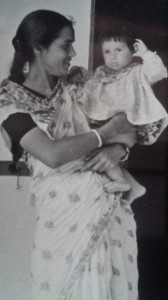
And it’s when she’d come to know
how seeds are stripped of light,
how they grow into an earth
which must bite off its tongue
not to have to wait for sweetness anymore….
Before the years cured her of hope,
she’d warn me not to
turn into the proverbial gourd-for-seed,
until I corrected that analogy one day
to her married, middle-class horror.
Technically, it’s you who are a bisor lāu,
if you come to think of it.
In our own pathetic ways, we’d learn
the stuff of seasons—
I, with three failed street-shows;
she, with the way our eyes turned to stone—
so one day, we’d stop fidgeting in our traps,
breathing whole years to seconds,
seconds to nows;
gather into a sanctuary inside us,
where dreams don’t sneak in disguised,
for a sampling,
a taste,
a quick bite.
I still suffer an urge to explain to her exactly how bad it is,
as though words would help us unlearn
the simplicity of this betrayal—
organs and glands
that foresaw the end of lies
but every bone in my body tells me she knows,
of course she knows:
we are fruits,
falling heavy and weightless
with what we know
and in this we are
beautiful and never
alone.
Nabanita Kanungo is the author of A Map of Ruins (Sahitya Akademi, 2014) and 159 (Poetrywala, 2018). Her poems have appeared in Caravan, Planet (The Welsh Internationalist), Prairie Schooner, ELSEWHERE LIT, The Missing Slate, VAYAVYA, and The Bombay Literary Magazine, among others. Her work has also been anthologised in Ten: The New Indian Poets (Nirala Publications, 2013), Gossamer (Kindle Magazine, 2015) and 40 under 40 (Poetrywala, 2016).